

Beads!!! Beading Supplies for Jewellery Making - Beads Jar UK. Provocations on assessment in ece web. Publications. Acas uses cookies to ensure we give you the best experience and to make the site simpler.
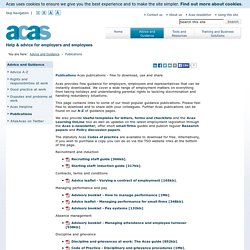
Find out more about cookies. Skip Navigation Help & advice for employers and employees Website URL : You are here: Publications. Support materials - Building the Ambition - Learning and teaching.
Support materials - Building the Ambition - Learning and teaching. Fun outside with kids. PreBirthToThreeBooklet_tcm4-633448. Learning Stories. Assessment and Planning. The world of assessment - animation - Assessment - Learning and teaching. Action Research. Research Methodologies. Improving communication, improving lives. Case study evidence. Talking Mats and Reviews An outreach worker at the Centre was working with a young boy who was experiencing significant difficulties at school including aggression and non-compliance.
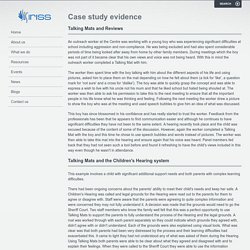
He was being excluded and had also spent considerable periods of time being looked after away from home by other family members. During meetings which the boy was not part of it became clear that his own views and voice was not being heard. With this in mind the outreach worker completed a Talking Mat with him. The worker then spent time with the boy talking with him about the different aspects of his life and using pictures, asked him to place them on the mat depending on how he felt about them (a tick for 'like', a question mark for 'not sure' and a cross for 'dislike').
This boy has since blossomed in his confidence and has really started to trust the worker. Talking Mats and the Children's Hearing system.
Playgroup Resources. Key Curriculum support - Education Scotland. Preparing Head Start Personnel to Use a Curriculum-Based Assessment. Play from Birth to Twelve: Contexts, Perspectives, and Meanings. Early Childhood Assessment: Why, What, and How. CAPEexpand. Sign In. References and further reading - National guidance and multimedia resource - Learning and teaching. Making learning visible in kindergarten classrooms: Pedagogical documentation as a formative assessment technique. Abstract This study investigated interactions between pedagogical documentation—a formative assessment technique and instructional intervention designed to increase student learning by recording children’s experiences—and kindergarten children, families and teachers in the UAE.
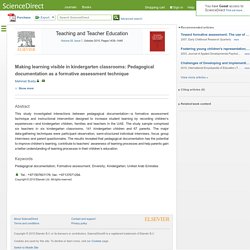
The study sample comprised six teachers in six kindergarten classrooms, 141 kindergarten children and 67 parents. The major data-gathering techniques were participant observation, semi-structured individual interviews, focus group interviews and parent questionnaire. The results revealed that pedagogical documentation has the potential to improve children’s learning, contribute to teachers’ awareness of learning processes and help parents gain a better understanding of learning processes in their children’s education.
Keywords Pedagogical documentation; Formative assessment; Diversity; Kindergarten; United Arab Emirates Copyright © 2010 Elsevier Ltd. 1395876765-ecece023_sample. Making judgments using the Continua of learning and development [Queensland Curriculum and Assessment Authority] Qklg_pd_planning_sample_1.
Sample observation of Nhi’s learning [Queensland Curriculum and Assessment Authority] Kindergarten samples and templates [Queensland Curriculum and Assessment Authority] Access keys | Skip to primary navigation | Skip to secondary navigation | Skip to content | Skip to footer | Problems viewing this site Kindergarten Samples and templates Planning Planning sample 1 (PDF, 126 kB)
![Kindergarten samples and templates [Queensland Curriculum and Assessment Authority]](http://cdn.pearltrees.com/s/pic/th/kindergarten-queensland-104798893)
Monitoring, documenting and assessing: Academic perspectives [Queensland Curriculum and Assessment Authority] Qklg_pd_plan_doc_child_learn_ctayler_tscript.pdf. Queensland kindergarten learning guideline professional development resources. Child Care Printables. Learning Story Template. EYLF Programming Documentations - Early Years Curriculum Planning. The Early Years Learning Framework describes the curriculum as “all the interactions, experiences, activities, routines and events, planned and unplanned, that occur in an environment designed to foster children’s learning and development”.
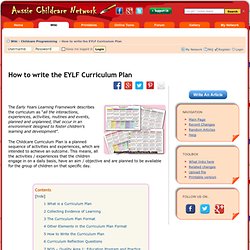
The Childcare Curriculum Plan is a planned sequence of activities and experiences, which are intended to achieve an outcome. This means, all the activities / experiences that the children engage in on a daily basis, have an aim / objective and are planned to be available for the group of children on that specific day. What is a Curriculum Plan The curriculum plan is a document that lists all the experiences, events and activities that are available for the children throughout the course of the day.
As part of implementing a curriculum plan, documentation (daily diary, learning stories and observations) becomes a resource tool that is used to reflect on and extend upon the children’s learning and development. Collecting Evidence of Learning. Early Years Foundation Stage paperwork. On this page you'll find all the guidance and templates Surrey Early Years and Childcare Service produce to help you deliver the Early Years Foundation Stage (EYFS).
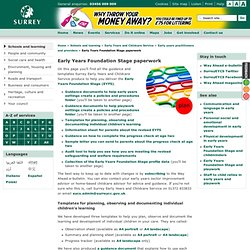
The best way to keep up to date with changes is by subscribing to the Way Ahead e-bulletin. You can also contact your early years sector improvement advisor or home-based childcare advisor for advice and guidance. If you're not sure who this is, call Surrey Early Years and Childcare Service on 01372 833833 or email eycs.admin@surreycc.gov.uk. Templates for Obs. CHCECE023_R1.pdf. CHCECE023_R1.pdf. Assessment overload exhausts early-years staff - News - TES.
Comment:3.7 average rating | Comments (33)Last Updated:14 May, 2010Section:News Discontent is growing over pupil observations “They won’t tell you what to do,” said Penny, a reception teacher in west London who asked to remain anonymous.
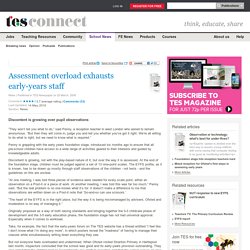
“But then they will come in, judge you and tell you whether you’ve got it right. We’re all willing to do what is right, but we need to know what is required.” Penny is grappling with the early years foundation stage, introduced six months ago to ensure that all pre-school children have access to a wide range of activities geared to their interests and guided by knowledgeable adults. Discontent is growing, not with the play-based nature of it, but over the way it is assessed. “At one meeting, I was told three pieces of evidence were needed for every scale point, either an observation on a Post-it or a piece of work. Eyfs_cards_0001207. Qca-01-799.pdf.pdf. Observation, Assessment and Planning. The EYFS Profile summarises and describes children’s attainment at the end of the EYFS.
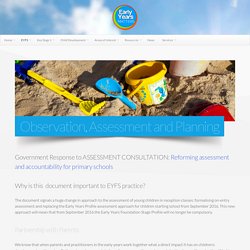
It is based on on-going observation and assessment in the three prime and four specific areas of learning, and the three learning characteristics, set out below: The prime areas of learning: • communication and language. 2013-eyfs-profile-handbook. EarlyYearsFoundationStage-PracticeGuidance.pdf. Objective-led Planning. Objective-led planning has to be the most effective way of taking teaching into children’s play that I have ever used.
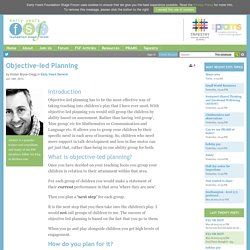
With objective-led planning you would still group the children by ability based on assessment. Rather than having 'red group', 'blue group' etc for Mathematics or Communication and Language etc. It allows you to group your children by their specific need in each area of learning. So, children who need more support in talk development and less in fine motor can get just that, rather than being in one ability group for both. Once you have decided on your teaching focus you group your children in relation to their attainment within that area. For each group of children you would make a statement of their current performance in that area 'where they are now'. Then you plan a 'next step' for each group. It is the next step that you then take into the children's play.
When you go and play alongside children you get high levels of engagement. The teacher. Early Years Foundation Stage Forum. Supporting Pedagogy and Practice in Early Years Settings - Shirley Allen, Mary E Whalley. DFE-RR071. Child Observation for the Early Years: 9780857257451 - Ioanna Palaiologou. This is a key text for all those studying for degrees and foundation degrees in early childhood, early years and related disciplines and for candidates on EYPS pathways.
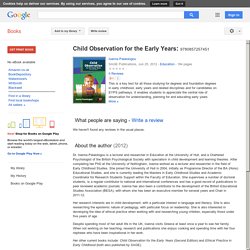
It enables students to appreciate the central role of observation for understanding, planning for and educating early years children. The theoretical background to child observation is covered in detail, the text highlights important works and considers the ethical implications. This Second Edition includes new chapters on recording and analysing and the curriculum and is fully updated throughout with links to the updated Early Years Foundation Stage. Interactive activities and real life case studies are included to help the reader engage with the text and make essential links between theory and practice.
About the Early Years Series. Good Practice in the Early Years. 2013-eyfs-profile-handbook. EarlyYearsFoundationStage-PracticeGuidance.pdf. Characteristics Of Effective Early Learning: Helping Young Children Become ... - Moylett, Helen. Revised EYFS Observation Assessment and Planning. The following pro-formas have been written to support you with developing your planning and assessment formats to ensure that they reflect the language and ethos of the revised EYFS. They will also give you the opportunity to reflect upon and adapt your current formats. These examples have been designed to meet the needs of a range of practitioners working with different age groups of children from babies to R/Y1.
A steering group, which included colleagues from the wide range of settings in York, trialled and evaluated the formats and their findings have been valued and incorporated. The purpose of this booklet is to select the particular format which you would find most useful and pertinent for your needs. These pro-formas are all optional. Any feedback would be gratefully received, please contact Vicky Northrop on 01904 553023 or email Vicky.northrop@york.gov.uk. To find out SENCo training dates, take a look at the Early Years and Out of School Clubs prospectus. Observations. 2013-eyfs-profile-handbook. Good Practice in the Early Years. Child Observation for the Early Years: 9780857257451 - Ioanna Palaiologou.
DFE-RR071. Supporting Pedagogy and Practice in Early Years Settings - Shirley Allen, Mary E Whalley. Early Years Foundation Stage Forum. Crawford.pdf. Together-towards-improvement-pre-school-education.pdf. Assessment informing learning - Education Review Office. JITE v32n2 - Five Principles for Guiding Curriculum Development Practice: The Case of Technological Teacher Education. Observation, Assessment and Planning Cycle in the EYFS. Observation Observation ‘involves practitioners observing children to understand their level of achievement, interests and learning styles, and then to shape learning experiences for each child reflecting those observations.’ [Statutory Framework for the Early Years Foundation Stage - 2012] Quality Observations are embedded in every day practice to build up an accurate picture of the unique child. Observation, Assessment and Planning Cycle in the EYFS.
Observation, Assessment And Planning In The Early Years - Bringing It All ... - Brodie, Kathy. Pre_school_guidance_pdf. Formative and Summative Assessment. Assessment is the use of a variety of procedures to collect information about learning and instruction. Formative and summative assessment represent two classifications of assessment, each with a distinct purpose. Formative assessment is commonly referred to as assessment for learning, in which the focus is on monitoring student response to and progress with instruction. Formative assessment provides immediate feedback to both the teacher and student regarding the learning process. Summative assessment is commonly referred to as assessment of learning, in which the focus is on determining what the student has learned at the end of a unit of instruction or at the end of a grade level (e.g., through grade-level, standardized assessments).
00413564.pdf. 00446639.pdf. Learning sessions. Early Years Collaborative. The objective of the Early Years Collaborative (EYC) is to accelerate the conversion of the high level principles set out in GIRFEC and the Early Years Framework into practical action. This must: Deliver tangible improvement in outcomes and reduce inequalities for Scotland’s vulnerable children. Put Scotland squarely on course to shifting the balance of public services towards early intervention and prevention by 2016. Sustain this change to 2018 and beyond. We have reached a point now where we have the commitment and the will to deliver in this area, and we have a strong evidence base about what works to make improvements. Key Changes Since January 2013, teams from across all 32 CPPs have embarked on improvement interventions to address issues identified on the agreed driver diagrams to meet local need. Initial work has commenced to understand the ‘Big ticket’ items that really make a difference to the EYC improvement work – these are being identified as potential ‘Key Changes’.
Speech, language and communication development - Maternal and Early Years. Infants emerge from the womb as multi talented and communicative individuals. New born infants have a whole host of communicative aptitudes. Articles. Floorbooks are blank books with heavy duty pieces of paper where we can record children's voices and their ideas to use in our planning. Group writing in a Floorbook allows shared thinking as children recall each others ideas and record them through writing, diagrams and photographs. This child centred approach records the evidence of the process of play and the learning that comes from it. Here are a few examples from our favourite floorbooks. Click on the image to see a larger photo. Fire Floorbook Covers. Mindstretchers - multi-sensory and real-world educational environments.
4Children_ParentsGuide_2015_WEB. EYFS_Practice_Guide1. EYFS_Practice_Guide1. SEAD_Guidance_For_Practioners.pdf. Practice Guidance for the Early Years Foundation Stage. Dh_108329.pdf. Healthy Child Programme: review of children aged 2. Guide to the Early Years Foundation Stage in Steiner Waldorf Early Childhood Settings. Guide to the Early Years Foundation Stage in Montesorri Settings. Booklet produced by the Montessori St Nicholas charity explaining how Montessori addresses EYFS themes and principles – show how the Montessori approach to planning, to the areas of learning and to assessment meets the requirements of the EYFS without compromising Montessorian principles. The EYFS supports these Montessori approaches, which have been used for over a hundred years. The sections of this 36 page booklet, produced for the 2008 EYFS standards, are Section 1: EYFS – principles into practice; Section 2: EYFS – overview of welfare requirements; Section 3: Learning and development requirements; Section 4: Observation, assessment and planning; Section 5: Examples of how Montessori settings meet the learning and development requirements; Section 6: Acknowledgements, useful addresses and further reading.
Download Guide to the Early Years Foundation Stage in Montesorri Settings. 4Children_ParentsGuide_2015_WEB. What to expect, when? A parents' guide. The purpose of this booklet is to help you as a parent/carer find out more about how your child is learning and developing during their first five years, in relation to the EYFS. Children develop more rapidly during the first five years of their lives than at any other time.
This booklet has been written to help you as a parent know what to expect during these vitally important years by focusing on the seven areas of learning and development which are covered in the EYFS. Assessing_Development.pdf. Early childhood education observation templates. Pathways-of-possibilities. Promoting the development of children’s emotional and social wellbeing in early childhood settings: How can we enhance the capability of educators to fulfil role expectations. EYLFPLP_Thinking_about_practice_Planner_Screen.pdf. Educators_guide_to_the_early_years_learning_framework_for_australia.pdf. Early Years. Provocations-on-assessment-in-ece-web.pdf.
Children's voices. Documentation: Transforming Our Perspective.